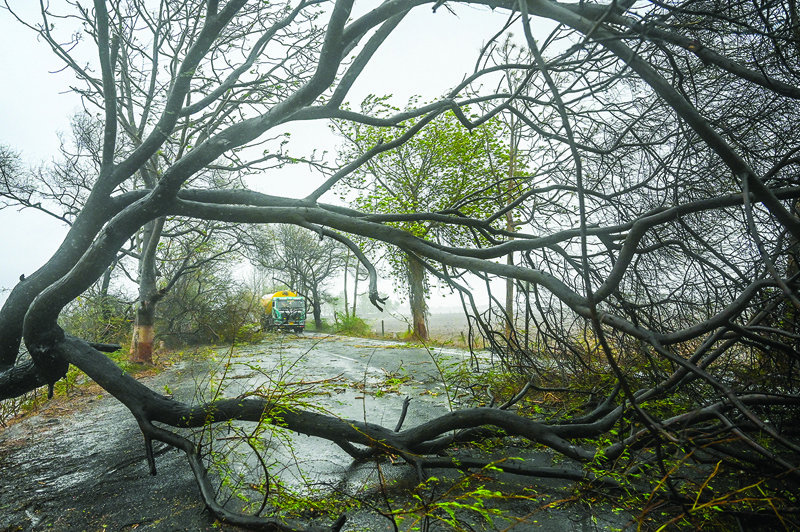 DIU, India: A truck is stranded on a highway yesterday after Cyclone Tauktae hit the west coast of India with powerful winds and driving rain. - AFP
DIU, India: A truck is stranded on a highway yesterday after Cyclone Tauktae hit the west coast of India with powerful winds and driving rain. - AFPMAHUVA, India: At least 33 people died and more than 90 were missing yesterday after a monster cyclone slammed India, compounding the country's woes as it posted a new record number of coronavirus deaths in 24 hours. The swirling system dubbed Cyclone Tauktae is the latest in what experts say is a growing number of increasingly severe storms in the Arabian Sea as climate change warms its waters.
Hundreds of thousands of people were left without power after the storm hit the Gujarat coast in western India on Monday evening, leaving a trail of death and destruction. Winds up to 130 km per hour smashed seafront windows and knocked over power lines and thousands of trees, blocking roads leading to affected areas, officials said.
"I have never experienced such intensity in my life," a hotel owner in the town of Bhavnagar said. "It was pitch dark as power was cut off and winds were making a roaring sound. It was scary." Prime Minister Narendra Modi was set to visit the cyclone-hit regions in Gujarat, his home state, today.
One support vessel serving oil rigs that were walloped by eight-meter waves off Mumbai sank and 93 of the 273 people who had been on board were missing, the Indian Navy said yesterday. The defense ministry said 180 people were rescued, with warships attempting to save the rest of the crew in "extremely challenging sea conditions".
Navy helicopters managed, however, to rescue all 137 people stuck on another barge that also slipped its anchor and ran aground. One other barge and an oil rig were also adrift. Elsewhere, seven new fatalities took the toll to 33, with most of the deaths occurring when houses or walls collapsed, Gujarat state chief minister Vijay Rupani said.
More than 16,500 houses were damaged, 40,000 trees were uprooted and nearly 6,000 villages were without electricity. Just over 2,100 villages had their power restored, officials said late yesterday. Although the cyclone was one of the fiercest in decades, better forecasting than in previous disasters meant that 200,000 people in danger zones were evacuated from their homes. "Our planning over the last three days has paid off. We have managed to minimize human casualties," said Rupani.
The cyclone barreled inland, weakening slightly but still bringing heavy rains and gale-force winds. Forecasters said it had eased into a deep depression and would further weaken into a depression overnight. The deadly weather system hit as India's healthcare system struggled with a coronavirus surge that in the past 24 hours killed a record 4,329 people.
Mumbai shifted about 600 COVID-19 patients from field hospitals "to safer locations". In Gujarat, all Covid-19 patients in hospitals within five kilometers of the coast were moved. Authorities worked to ensure there would be no power cuts in hospitals and 41 oxygen plants. More than 120 hospitals with COVID-19 patients experienced power disruptions, although electricity supply had been restored to many of them, officials said late yesterday.
However, one COVID-19 patient died in the town of Mahuva after he could not be moved in time before the storm hit, doctors said. The state also suspended vaccinations for two days. Mumbai did the same for one day. "This is one of the most powerful cyclones we've faced in India for decades, and after weeks of chaos and devastating loss of life caused by COVID-19, it could not have come at a worse time," Save the Children India's Santanu Chakraborty said in a statement yesterday. - AFP









